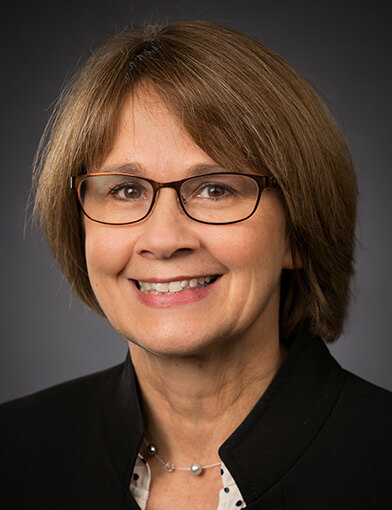
As nurses were pushing Karen Hills’ gurney down the hall to the operating room where she would have her appendix removed, she couldn’t help but quiz them.
“I asked them if they were hanging cefotetan on my IV bag,” she said, recalling her concern about the anaerobes that were in her gut. At the time, Hills was in her didactic year at the Wake Forest PA Studies program, and the acute abdomen lecture was fresh in her mind.
Before she had even completed her PA training, Karen Hills, DHSc, MS, PA-C ’99, showed that teaching was in her future.
Today, she serves as Senior Advisor for Doctoral Education Strategy at the National PA Education Association (PAEA). Her work involves helping PA programs across the country develop doctoral education pathways.
Her career has also included working at Duke University’s PA program, where she rose from a teaching fellow to program director. Before entering PA school, Hills also worked in health promotion and disease prevention at the Wellness Council of North Carolina.
Something Was Missing
Despite her experience in education, Hills is no stranger to clinical practice. After graduating from the Wake Forest PA Studies program in 1999, she worked in cardiology and later in family practice.
She said she enjoyed clinical work, but admitted it wasn’t perfect for her. “When I was in family practice, I realized I loved the variety and the patient care. But something was missing,” she said.
That “something” was the opportunity to teach and mentor aspiring PAs. So when she saw an ad about a teaching fellowship at Duke University, Hills knew it was right for her.
“It was the perfect job for me,” she said. “It would allow me to work in a clinical practice, but also in an academic setting, teaching students and doing scholarly work.”
Hills applied for the fellowship and was accepted. After completing the fellowship, she was offered a full-time faculty position at Duke and spent 16 years teaching and mentoring future generations of PAs, while also maintaining clinical practice.
Hills credits Wake Forest’s inquiry-based learning approach with preparing her for both clinical practice and teaching. The collaborative, problem-solving focus of the curriculum instilled in her the critical thinking and teamwork skills necessary for a successful career.
“PAs talk about being lifelong learners, and the Wake Forest program sets up students to be responsible for continuing to learn throughout their careers,” she said. She also noted that the program emphasized camaraderie and collaboration, key elements in her work as an educator and clinician.
PAs as Innovators
Hills views the PA profession as an essential part of modern healthcare. “The world is changing. Healthcare is changing. I think of PAs as innovators, who are genuinely focused on finding ways to improve the health of others and making healthcare more accessible to more people,” she said.
She emphasizes the team-based approach of the profession, which allows PAs to be nimble and flexible in meeting the evolving needs of healthcare.
According to Hills, the flexibility of the PA profession is one of its greatest strengths. “In addition to being a clinician, there are opportunities to help the next generation of providers along,” she said.
She encourages aspiring PAs to consider the breadth of opportunities available, from precepting and lecturing to full-time teaching. “You don’t have to be pigeonholed and think you’re going to do the same thing every day,” she said.
For Hills, being a PA is about growth, collaboration, and the honor of helping others. It’s a career she proudly describes as “the best choice in healthcare.”
